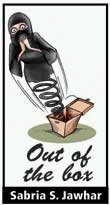Monday, 19 March 2007
By Sabri S Jawhar
The Saudi Gazette
THE other day Abdullah Juma, president of Saudi Aramco, launched the opening of a traffic show to mark the 23rd annual GCC Traffic Week.
The idea is to promote traffic safety. Juma said that motorists and road conditions are the primary factors behind traffic accidents, and pointed to speeding as especially troublesome.
Well, excuse me if I don’t get excited.
I admire Saudi Aramco for taking a proactive approach to traffic safety. But with all due respect to the organizers of GCC Traffic Week, the program hardly begins to tackle the real problem of road safety in Saudi Arabia. In fact, it barely scratches the surface.
Reliable statistics of fatal traffic accidents in the Kingdom are hard to come by, but the Department of Neurosciences at the Armed Forced Hospital in Riyadh reported that between 1971 and 1997, 564,792 people died or were injured in road accidents. That’s equivalent to about 3.5 percent of the total population of our country.
More than 65 percent of accidents occur due to excess speeding or running red lights. Blown tires are the No. 2 reason for accidents.
If I had more recent numbers I’d give them to you, but those are sobering enough. And what is even more gruesome is the fact that in the past three years 140 teachers have been killed in road accidents. Eighty-six of those deaths are teachers from the southern Asir region.
We wring our hands each year over needless traffic deaths when we launch road safety programs, but beyond the rhetoric little is accomplished.
I am traveling with my driver on the streets of Jeddah every day and watch with horror the accidents and near accidents caused by the careless and the rude drivers. I hear incessant honking the second a traffic light turns green as if cars will move faster.
I see left turns from right-hand lands. I see right turns from left lanes. I don’t think I have ever seen a stop sign honored. I see speed contests among teenagers on motorcycles and in sports cars on congested Tahlia Street in the commercial district.
I see untrained taxi drivers with no business ferrying passengers in this city weave in and out of traffic at high speeds.
I see cars double parked. I see traffic officers idle at busy intersections while car after car runs a red light. I see huge potholes in the streets and crumbling sidewalks that force pedestrians to walk on the roadway.
And worse, I see unrestrained children bouncing inside cars and popping out of sunroofs as if they are immortal.
Yes, these ignorant, careless people – Saudis and expats alike – are responsible for this outrageously dangerous behavior.
But at the end of the day it’s the traffic police and the authority of the Saudi government behind the police responsible for our lives.
Enforcement is sporadic at best. I’m always pleased to see checkpoints manned by police looking for seatbelt violators, but distressed to hear stories about Saudis using “wasta” to avoid fines or berating patrolmen attempting to write citations.
And it serves no purpose to employ discriminatory practices of automatically faulting expat drivers in traffic accidents involving Saudis.
What’s the use of having traffic laws if the laws are not enforced? What’s the purpose of having a traffic safety awareness week if no one pays attention.
We all say the right things about being attentive to fellow motorists and tsk tsk over the latest traffic fatality report, but for some reason we don’t have the ability to slow down, belt our kids into seats, respect the driver next to us and honor all traffic laws.
Saudi society has come a long way. We are members of the WTO and we are moving towards opening our country to foreign tourists.
Do we really want to show our guests our poor behavior on the road? You can measure a society’s attitudes towards its own people and to its guests by how well it enforces traffic safety laws.
What does that say about us?
Saturday, March 24, 2007
Subscribe to:
Post Comments (Atom)


No comments:
Post a Comment